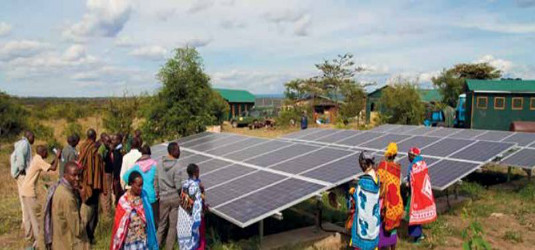The International Energy Agency (IEA) has put forward new analysis finding that the most cost-effective strategy for universal electricity access in developing countries is compatible with the demands of global climate change goals, and will prevent millions of deaths each year. The main beneficiaries would be women in developing nations, who could be freed from the pressures of sourcing fuelwood.
Developing states in Asia are on course to provide universal electricity access by 2030, the IEA report states, with India to reach this goal by the early 2020s. However, 674 million people globally will still be without electricity in 2030, with the majority of them in sub-Saharan Africa.
Fatih Birol, the IEA's executive director said: “The good news is that a convergence of political will and cost reductions is accelerating progress […] Just look at India, which has provided electricity access to half a billion people since 2000. The government's tremendous efforts over the last several years have put it on track to achieve one of the biggest success stories ever in electrification.”
The report also underlines that there is an “energy for all” case to be made with the required investment to reach the 2030 goals ($31 billion) representing only 2% of the global energy investment. With this in mind, the large amount of remaining funds can be directed to developing access to electricity to sub-Saharan Africa, mostly through renewables investment.
Energy for all would be beneficial to everyone, the report argues; with cleaner household air preventing 1.8 million respiratory deaths per year, greenhouse gas levels held steady, and energy demands and CO2 emissions rising by around 0.2%.
The IEA states that there are additional benefits to achieving energy for all. In developing nations, women will save one hour per day when they do not need to collect fuelwood, for example, freeing up the equivalent of a workforce of 80 million people.
“The goals of meeting energy access for all, reducing air pollution and meeting global climate targets go hand in hand,” said Dr Birol. “Energy for all is achievable and our ambitious strategy shows how countries can build on existing policy and technology success stories to accelerate access at the lowest cost.”
He continued “But to achieve the same results as we have with electricity, policy-makers must also place clean cooking at the top of their agenda […] With its years of experience on energy and development analysis, and its robust energy policy and technology expertise, the IEA is ready to support governments in Africa, Asia and elsewhere meet these goals.”
This content is protected by copyright and may not be reused. If you want to cooperate with us and would like to reuse some of our content, please contact: editors@pv-magazine.com.



1 comment
By submitting this form you agree to pv magazine using your data for the purposes of publishing your comment.
Your personal data will only be disclosed or otherwise transmitted to third parties for the purposes of spam filtering or if this is necessary for technical maintenance of the website. Any other transfer to third parties will not take place unless this is justified on the basis of applicable data protection regulations or if pv magazine is legally obliged to do so.
You may revoke this consent at any time with effect for the future, in which case your personal data will be deleted immediately. Otherwise, your data will be deleted if pv magazine has processed your request or the purpose of data storage is fulfilled.
Further information on data privacy can be found in our Data Protection Policy.